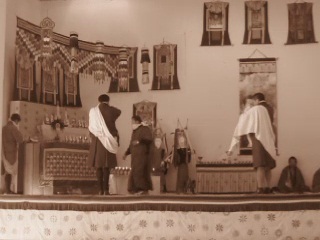The classroom...
You would not believe how well behaved the children are. When I
walk into the room they all stand to greet me and wait for me to ask them to
sit, upon which they thank me in chorus. We then stand in silence for a minute of mindfulness before beginning. If I ask them to read a passage
from the book, the room fills with whispers of them all reading out loud. If I
wanted them to, they would copy out the entire textbook for me, in silence,
neatly and with care. Their notes are outstanding. Their books
immaculate. When I set some work, every single head goes down, every pen scribbles and the only audible noise in the room is the pitter-patter of industry. Sometimes, if they haven’t understood the instruction, they just keep reading…. once again, they’d read the whole textbook if I asked them to!
Academically the Year 11 students are generally bright. They can rearrange
equations, derive units, deploy exponentials and recall laws. But I find it very
difficult to get students to think independently, especially in Year 10. They
want to copy out from the text book. They want me to dictate
to them. They want me to write on the board for them, and they will
copy everything I put there unless I stop them. When I enter the classroom they
all open their textbooks. If I ask them a question, they scan the text for the
answer. Or, remarkably, they give me a textbook definition from the previous
year, stored perfectly for recall. And if I try to check for understanding, they have uncanny skills of reassurance. I've been fooled on several occasions into thinking they've grasped something when they clearly haven't. Now I am more insistent, and they are less shy about admitting if there's a problem. I've learnt not to trust a chorus of 'Yes Sir!'.
Education is about fertilising the mind and drawing out talent,
exploring potential, investigating the vast accumulation of knowledge, culture
and concepts that have been amassed by us since we first developed our minds
beyond the rudimentary ability to grunt. It’s about developing the faculties of
critical thinking and independence of thought so values have integrity instead
of being dictated by popular majority, television, governments or corporations.
It’s not about regurgitating letters from a page. And yet it is. Only a
conceited and irresponsible teacher would strive for such idealistic notions to
the detriment of their student’s results and the opportunities that derive from
good performance.
Much to their amusement, I told one class that they were all
little baby birds, and I was like a mother bird who flies back to the classroom
and regurgitates physics into their waiting mouths. They laughed – they do get
it, but they are habituated to a different way of learning. I’m taking
baby-steps to change this. Slowly and carefully, because, yes, they still have
exams to sit and the Year 11 students have clearly learnt a great deal from the
methods they are accustomed to, both skills-wise and factually. I don’t intend
to rock the boat too hard. I ask them to set each other questions for homework –
make up a situation, give just enough information to solve the problem and get a
friend to solve it and I model the question types in class beforehand. It’s a
small step, but it’s a start. And I make sure all textbooks are closed unless I
need them open.
In a TED Lecture, Benjamin Zander talked about judging the
success of his work (and life) on the basis of shining-eyes. The more eyes you
see shining around you, the more successful you are. Inspiration gets eyes
shining, but the light is temporary. Inspiration of enthusiasm is more
sustainable, and this is what a teacher strives for. How many eyes are shining
when students are copying off the board? None. So I won’t jeopardise any grades,
but I will do my best on to get the eyes shining.
 |
A final word about the children. They really are quite amazing.
Their behaviour reflects the characteristics that the Bhutanese as a nation are
proud of; humility, compassion, tolerance, respect, and … you guessed it…
happiness. Their respectful behaviour is genuine. They step out of the way when I walk through a corridor and stand still until I pass. They all say 'Good afternoon' with a slight bow. They care for each other. They
are teenagers, silly and a bit bonkers as all teenagers are, irritatingly
immature sometimes, but they have a serious quality when it comes to learning that is more
commonplace than rare. This may derive from their backgrounds.
Nearly all of them come from materially poor families. They have
all worked hard, most of them in subsistence farming. They share the respect for
their country and its leaders that is ubiquitous among the people. They value
education and this leads to gratitude. Gratitude inevitably leads to humility,
which naturally blossoms into the virtues of tolerance, compassion and
understanding. If everybody could cultivate some genuine gratitude in
themselves, I’m sure the world would be a better place.



















